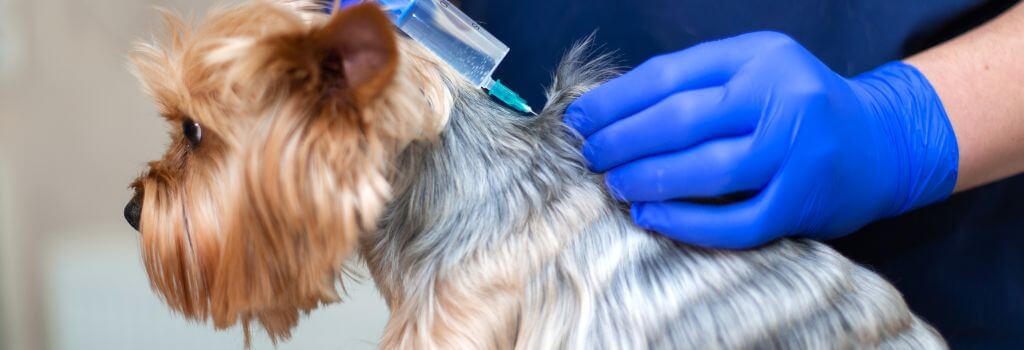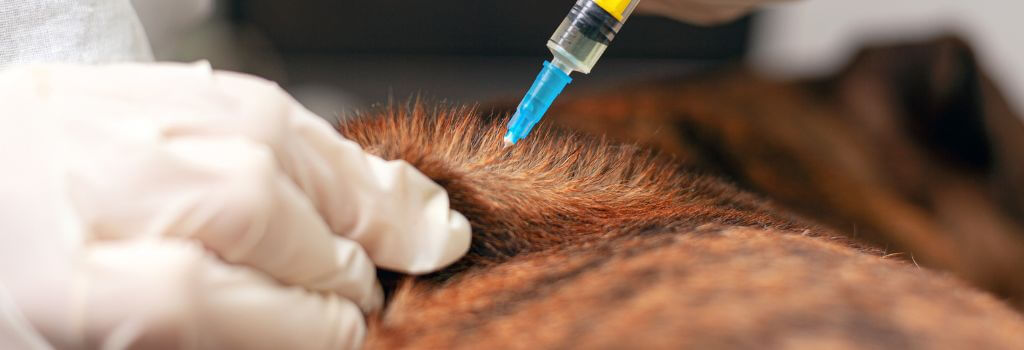Ensuring your dog stays healthy starts with a comprehensive vaccination plan. A proper puppy vaccine schedule is essential to protect against various infectious diseases. In this guide, we’ll discuss core vaccines, lifestyle-based vaccines, and recommended vaccine schedules for puppies and adult dogs based on recommendations and guidelines from veterinary professionals and organizations.
What Is a Vaccine Schedule for Dogs?
Before we cover exactly what vaccinations a dog needs and when, let’s start with the basics. What exactly do veterinarians mean when they mention a vaccination schedule?
A vaccine schedule outlines the timing and types of vaccines dogs need at different life stages to protect them from contracting common and preventable diseases. Puppies and adult dogs have different vaccine needs to stay protected from the diseases they are most vulnerable to. Properly adhering to a dog vaccine schedule reduces the risk of serious health issues and helps prevent the spread of contagious diseases.
Core Vaccines: The Essential Puppy Shot Schedule
Core vaccines are the standard vaccines that all dogs should receive, as they protect against prevalent, potentially fatal diseases. The diseases that these vaccinations protect against are prevalent and common enough that veterinary experts have determined all dogs should be protected from. Many major veterinary bodies and organizations classify these core vaccines as essential due to their ability to control widespread health risks in dogs and humans.
Core Vaccines Include:
- Rabies: Protects against rabies, a zoonotic disease transmissible to humans.
- Canine Distemper: Prevents a virus that affects respiratory, digestive, and nervous systems.
- Canine Parvovirus: Prevents parvovirus, a highly contagious and often fatal disease, especially dangerous in puppies.
- Canine Adenovirus: Protects against hepatitis and respiratory infections.
- Parainfluenza: Often included in core vaccines, it guards against respiratory illness.
Leptospirosis Update: Recent guidelines suggest that leptospirosis should be considered a core vaccine, and the American Veterinary Medical Association (AVMA) and the American College of Veterinary Internal Medicine (ACVIM) have included the leptospirosis vaccines in the core category as of their most recent dog vaccination recommendations. In the United States, leptospirosis is considered an endemic and is being taken seriously by the veterinary community, as it is zoonotic and can spread not only amongst dogs, buy also to humans.

Non-Core or Lifestyle Vaccines: Tailoring Shots to Your Dog’s Needs
Non-core vaccines, or lifestyle vaccines, are recommended based on each dog’s environment, lifestyle, and potential exposure risks. A veterinarian can help decide which non-core vaccines are suitable using the American Animal Hospital Association (AAHA) lifestyle questionnaire or a conversation with pet owners.
Common Non-Core Vaccines:
- Lyme Disease: Essential in areas where Lyme disease is common, such as regions with prevalent deer and Ixodes ticks.
- Canine Influenza (H3N8 and H3N2 strains): Protects against two strains of canine flu.
- Bordetella: Also known as the "kennel cough" vaccine, this vaccination is ideal for dogs that interact with others in places like boarding facilities, groomers, or dog parks.
- Respiratory Parainfluenza and Adenovirus: Protect against respiratory diseases common in social or high-exposure environments.
When determining which non-core vaccines are right – and necessary – for your dog, your veterinarian will likely conduct a lifestyle assessment to determine what risks your dog is regularly exposed to and, therefore, needs to be protected from. Lifestyle assessments include your dog’s exposure to other dogs at boarding, dog shows and other events, groomers, dog parks, family members, and so on. Be sure to bring up your dog’s lifestyle when you visit your veterinary clinic, as well as any concerns you may have about exposure to certain transmissible illnesses.
Important for Breeding Kennels: Breeding kennels have an increased risk of exposure based on numbers of dogs, dogs moving in and out of the kennel, pregnancy causing immunosuppression, and the age of younger pups. Certain vaccines, like the canine coronavirus vaccine, may be indicated for breeding dams in facilities where coronavirus is confirmed. Additionally, lifestyle factors such as pregnancy, exposure to multiple dogs, and immunosuppression risks are important considerations for breeders.
Puppy Vaccine Schedule: What Shots Do Puppies Need? And When?
ALL puppies need to be vaccinated! No matter what breeders or online forums tell you, vaccination at this life stage is so important for the long-term health and survival of a puppy and should be considered absolutely necessary. All of the diseases that we vaccinate against in puppies are completely preventable with the right vaccination administration and timing.
Like human babies, puppies are more vulnerable to diseases in early life stages, so vaccinating them according to a well-timed puppy shot schedule is crucial. Starting a puppy’s vaccine regimen at the right time and following recommended booster intervals can make a significant difference in long-term immunity, and therefore, long-term health.
- Initial Vaccine at 6-8 Weeks: The first puppy vaccine should be administered at 6-8 weeks, typically the parvovirus vaccine or a combined Distemper/Parvo (DAPPv) vaccine.
- DAPPv Booster Series: After the first dose, puppies need boosters every 2-4 weeks until they are 16-20 weeks old.
- Leptospirosis (4-Way): Begin leptospirosis vaccinations at 12 weeks. Administer two doses, spaced 2-4 weeks apart, with an annual booster to follow.
- Rabies Vaccine: Puppies should receive the rabies vaccine based on state laws, as rabies prevention is critical to both animal and human health. Depending on what state you live, the recommended timing for this vaccination may vary.
- Bordetella, Parainfluenza, and Canine Influenza: Consider annual vaccinations for puppies at risk of upper respiratory infections.
Certain core vaccines, such as rabies, can only be administered by a licensed veterinarian or, in some states, by a licensed or certified veterinary technician. It's always better to work closely with your veterinarian to navigate your dog's vaccination needs rather than go it alone.
Vaccine Schedule for Adult Dogs: What Shots Do Dogs Need? And When?
Once dogs have completed their puppy vaccines, they still require regular boosters to maintain immunity throughout adulthood – which means, you’ll still need to keep up with vaccinations throughout the course of your dog’s life. The frequency of boosters can vary based on individual needs, but the following general guidelines are recommended:
- DAPPv Booster: A booster is recommended one year after the last puppy DAPPv vaccine, then every three years.
- Rabies Vaccine: Given according to state law, usually every three years after the initial adult booster.
- Leptospirosis, Lyme, Bordetella, and Influenza Vaccines: These vaccines are administered annually, as immunity can wane more quickly.
In addition, adult dogs in regions where rattlesnakes are common may benefit from the rattlesnake toxoid vaccine.
Considering Titers for Boosters
Some veterinarians may recommend a titer test instead of automatic boosters for certain vaccines, such as DAPPv. A titer measures the level of antibodies in the dog’s blood to determine if they still have immunity against specific diseases.
The Importance of Rabies Vaccinations
Rabies vaccination is a legal requirement in most areas because rabies is a fatal disease that can also affect humans. Only licensed veterinary professionals should administer the rabies vaccine, as they follow strict protocols to ensure efficacy and safety. In many states, owner-administered rabies vaccinations are not considered legal, and at-home administration of this vaccine should be avoided.
Rabies vaccines are taken seriously by veterinarians, not just for protecting dogs, but also for public health. A vaccinated dog helps protect everyone they come into contact with – not just other dogs, but humans and other animals as well.

Creating a Tailored Vaccine Plan for Your Dog
With lifestyle changes, travel, or new exposures, your dog’s vaccination needs may also change. Always discuss your dog’s daily activities, social interactions, and travel plans with your veterinarian to keep them protected against new risks.
For example:
- Frequent Boarders or Social Dogs: Dogs that spend time in boarding facilities, attend training classes, or frequent dog parks might benefit from the Bordetella, parainfluenza, and canine influenza vaccines.
- Active Outdoor Dogs in High-Tick Areas: In tick-heavy regions, the Lyme vaccine is crucial to prevent Lyme disease, especially in areas with high exposure to white-tailed deer and ticks.
Regular checkups ensure your veterinarian can assess your dog’s current health status, lifestyle, and risks, helping you decide on any updates to their vaccine plan.
Work with Your Veterinarian to Navigate Dog & Puppy Vaccine Schedules with Ease
Understanding and following a dog vaccine schedule, tailored to your dog’s unique lifestyle and approved by a veterinarian, helps protect them from a range of diseases while reducing health risks for every human and pet in your family. For specific recommendations, always consult your veterinarian — they’re your best resource for a vaccination plan that covers everything your dog needs to lead a healthy, illness-free life.
If you have questions and you'd like to reach out to us, you can call us directly at (920) 269-4072, or you can email us at [email protected]. Don't forget to follow us on social media Facebook, Instagram.
